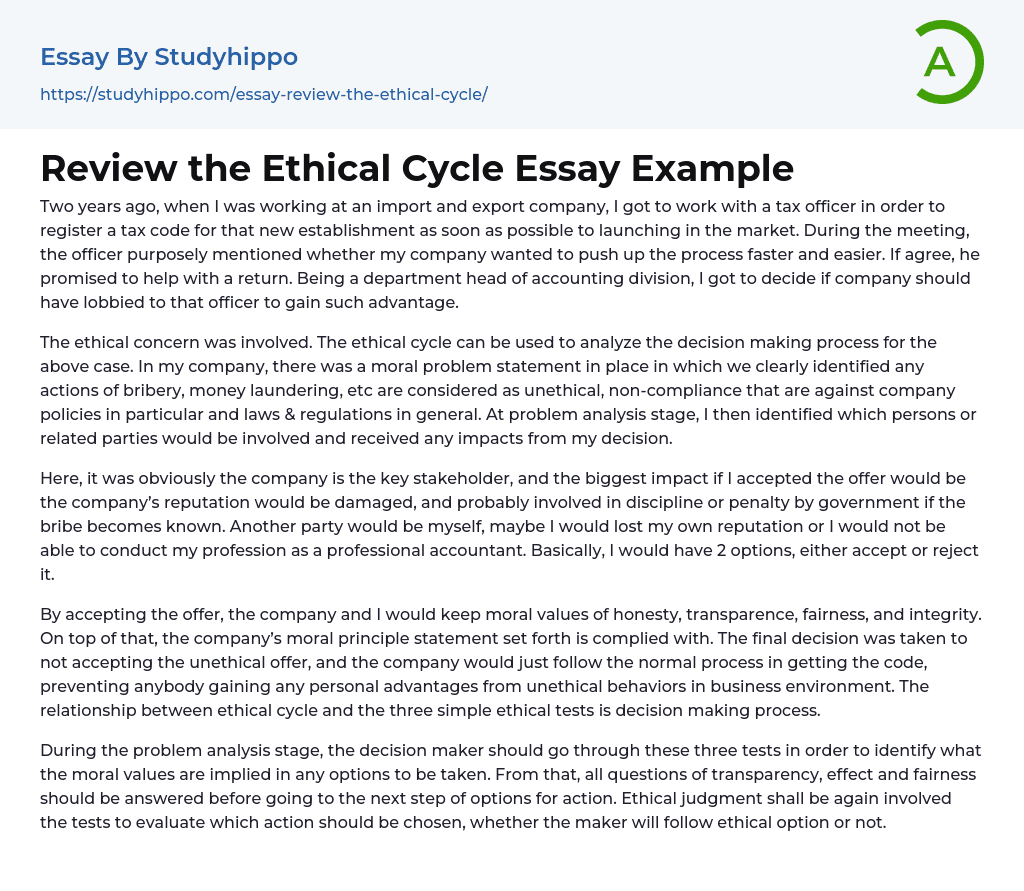Two years ago, when I was working at an import and export company, I got to work with a tax officer in order to register a tax code for that new establishment as soon as possible to launching in the market. During the meeting, the officer purposely mentioned whether my company wanted to push up the process faster and easier. If agree, he promised to help with a return. Being a department head of accounting division, I got to decide if company should have lobbied to that officer to gain such advantage.
The ethical concern was involved. The ethical cycle can be used to analyze the decision making process for the above case. In my company, there was a moral problem statement in place in which we clearly identified any actions of bribery, money laundering, etc are considered as unethical, non-
...compliance that are against company policies in particular and laws & regulations in general. At problem analysis stage, I then identified which persons or related parties would be involved and received any impacts from my decision.
Here, it was obviously the company is the key stakeholder, and the biggest impact if I accepted the offer would be the company’s reputation would be damaged, and probably involved in discipline or penalty by government if the bribe becomes known. Another party would be myself, maybe I would lost my own reputation or I would not be able to conduct my profession as a professional accountant. Basically, I would have 2 options, either accept or reject it.
By accepting the offer, the company and I would keep moral values of honesty, transparence, fairness
and integrity. On top of that, the company’s moral principle statement set forth is complied with. The final decision was taken to not accepting the unethical offer, and the company would just follow the normal process in getting the code, preventing anybody gaining any personal advantages from unethical behaviors in business environment. The relationship between ethical cycle and the three simple ethical tests is decision making process.
During the problem analysis stage, the decision maker should go through these three tests in order to identify what the moral values are implied in any options to be taken. From that, all questions of transparency, effect and fairness should be answered before going to the next step of options for action. Ethical judgment shall be again involved the tests to evaluate which action should be chosen, whether the maker will follow ethical option or not.
- Values of Life essays
- Ethical dilemma essays
- Normative Ethics essays
- Virtue Ethics essays
- Belief essays
- Deontology essays
- Moral essays
- Virtue essays
- Work Ethic essays
- Acceptance essays
- Age Of Enlightenment essays
- Child Observation essays
- Confucianism essays
- Conscience essays
- Critical Reflection essays
- Destiny essays
- Determinism essays
- Empiricism essays
- Environmentalism essays
- Epistemology essays
- Ethics essays
- Ethos essays
- Existence essays
- Existentialism essays
- Fate essays
- Free Will essays
- Functionalism essays
- Future essays
- Good And Evil essays
- Human Nature essays
- Individualism essays
- Meaning Of Life essays
- Metaphysics essays
- Natural Law essays
- Personal Philosophy essays
- Philosophers essays
- Philosophy Of Life essays
- Political Philosophy essays
- Pragmatism essays
- Reality essays
- Relativism essays
- Teaching Philosophy essays
- Time essays
- Transcendentalism essays
- Truth essays
- Utilitarianism essays
- Adaptation essays
- Adventure essays
- Adversity essays
- Aging essays




